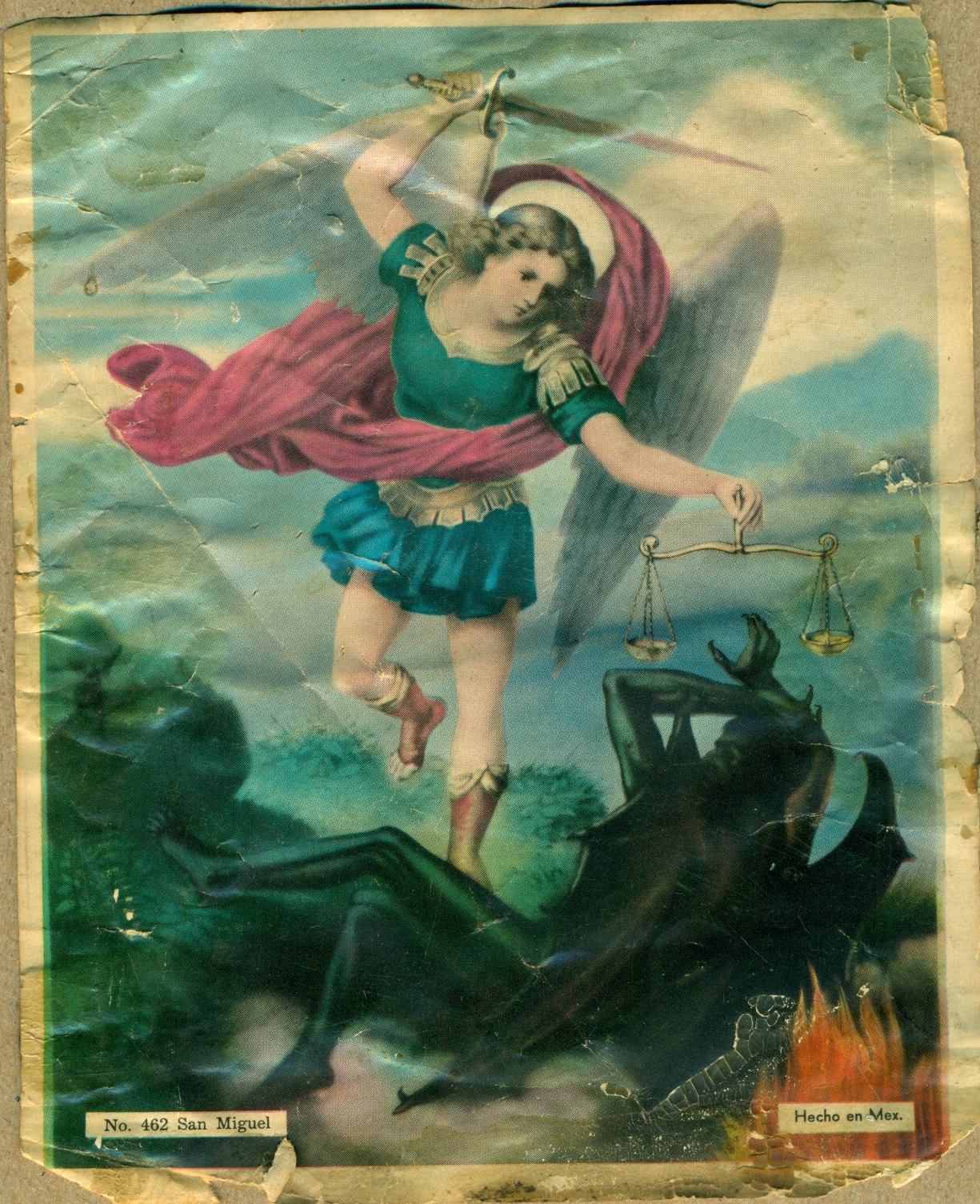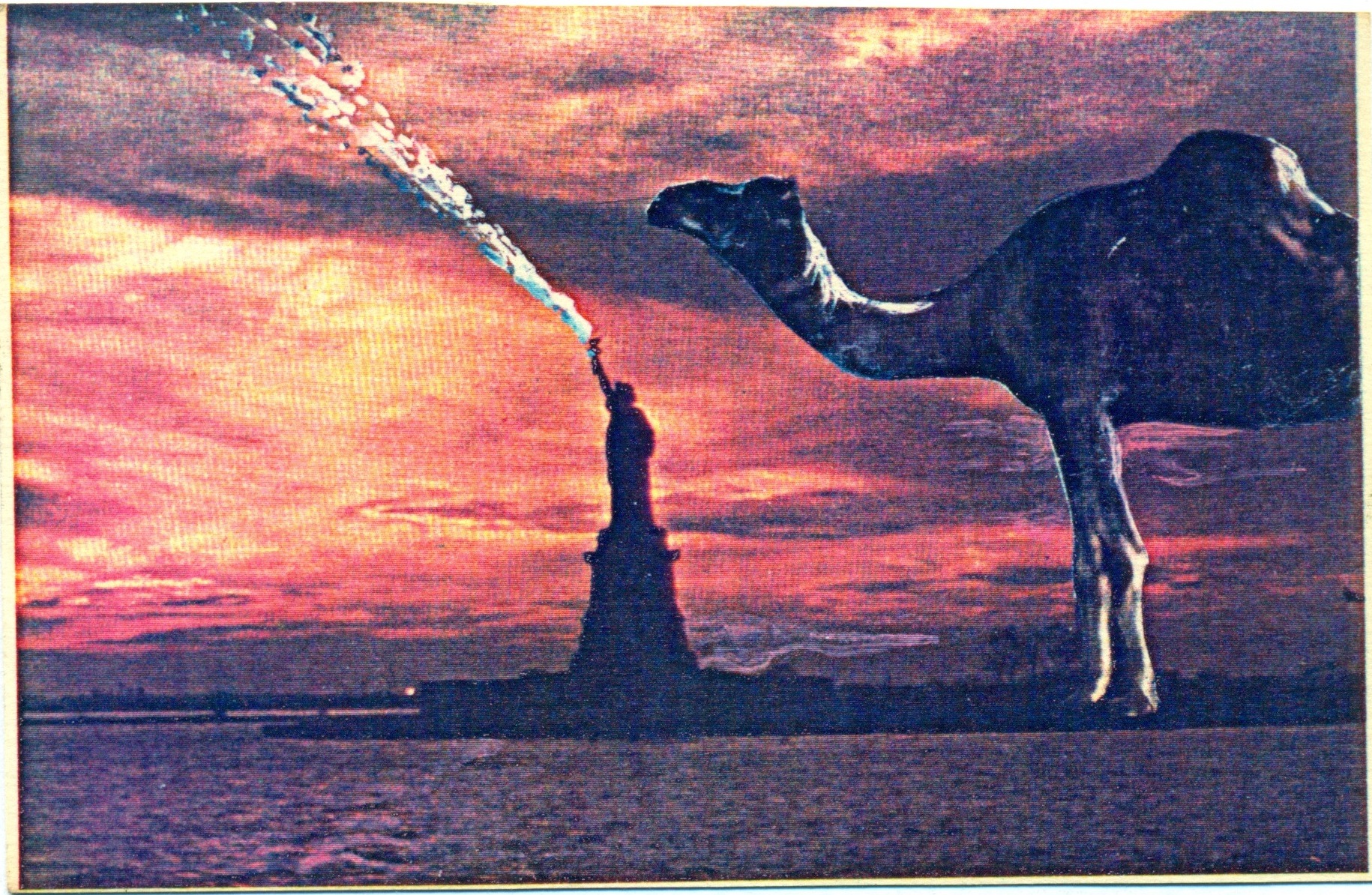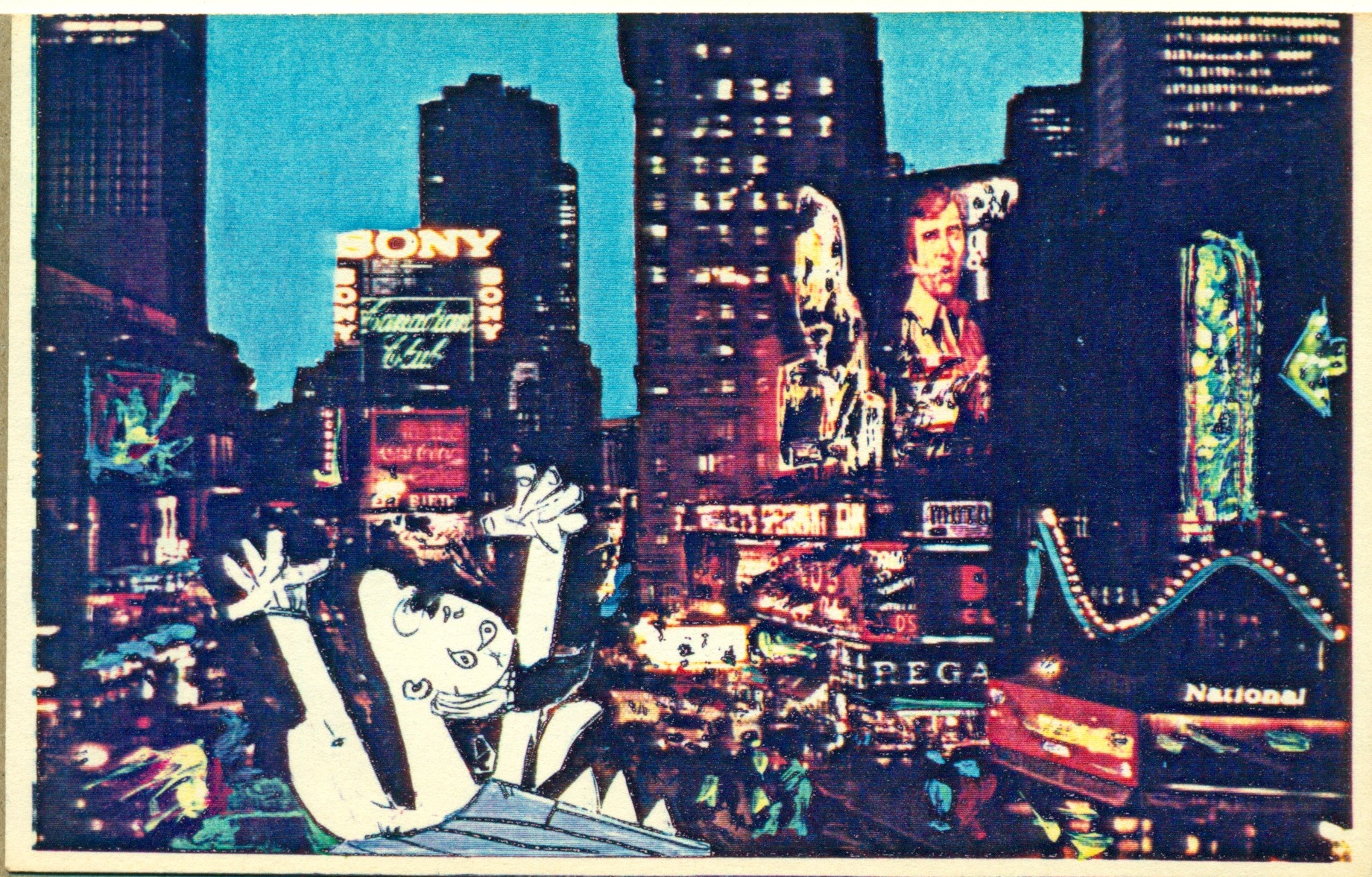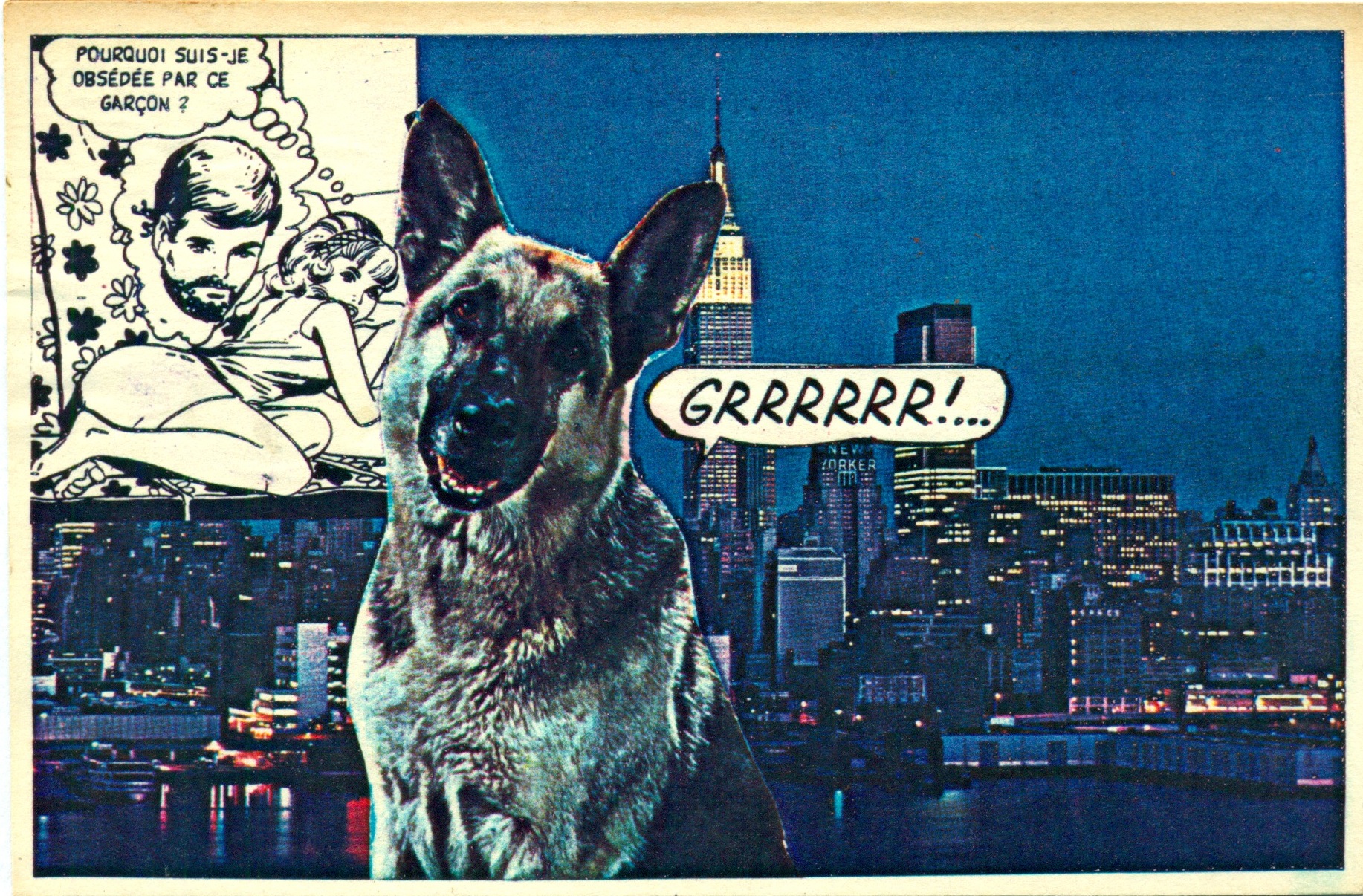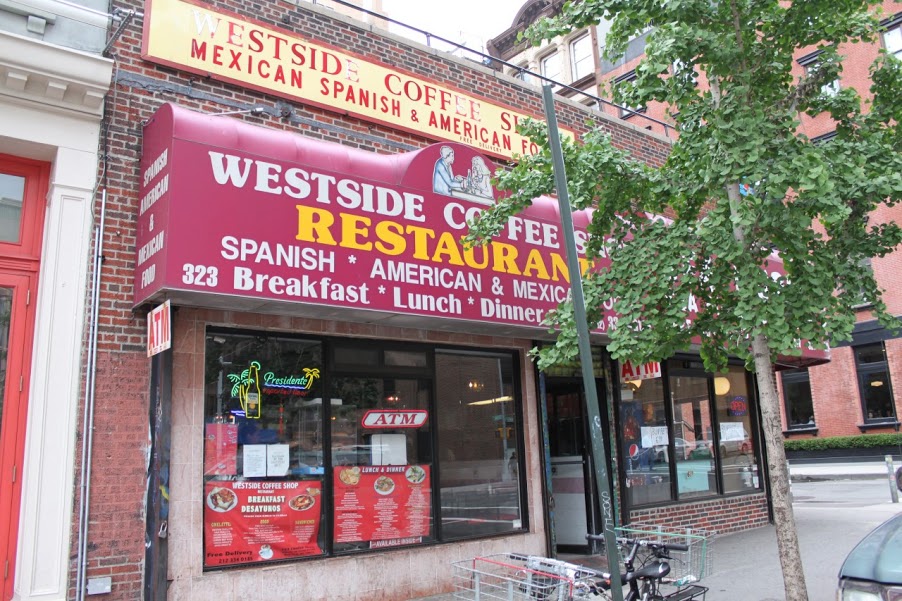…
I tell my students I’m not religious freeing myself from taking sides in any discussions that might come up although they never do: English is what’s important, similarity not difference. My students are mostly Christians from South America, Muslims from Africa, and the Chinese who often turn out to be atheists; I think they leaned that way long before the communists. If there is a God, I agree with Woody Allen that He has a lot of explaining to do. Sometimes I say the Lord’s Prayer and the one that goes “I take refuge in the Buddha, I take refuge in the Dharma, I take refuge in the Sangha,” when I want to meditate, breathe and relax; no agnostics in foxholes I guess. I doubted God around the same age Huck Finn did when he said, “All right, I’ll go to hell then.” That being said, the image of Saint Michael always makes me glad.
…
The San Miguel you see above I found slipped into the door frame of what was to become my room in the first apartment I moved into with my friend Patricia Kelly when we moved from Philadelphia to Manhattan in August 1979. We’d been staying with our friend Marcia in a huge space she shared with several others near Houston and the Bowery. Marcia, at the time a lunchtime waitress, had a hard time waking up so she had a dozen or so alarm clocks set to go off at seven o’clock waking Patti and me sleeping in sleeping bags on the floor. Marcia slept on, all the while snoring, like a sawed log. She was an artist who’d given up art to pursue love frequenting A.A. meetings and church socials until she found a boyfriend, who, as it turned out, stole her panties and wore them, a pyromaniac too who started a fire in her bedroom, but that was after Patti and I moved out.
I wanted to live in Chinatown, but the Chinese wouldn’t have it. One lady got so mad when I asked if she had rooms to rent she chased us from her store, shooing us like dogs or chickens who’d somehow wandered in. At the Buddhist temple near Chatham Square we stopped to see if anyone knew of a place. There is a room that has a huge golden Buddha. In front of it, a man with his back to us was lighting incense. He turned, saw us, and sensing we had a question, approached. His face was the most deformed I’d ever seen; I thought of napalm in Vietnam. His features had melted one thing into another, hardly an ear or a nose—I couldn’t imagine anyone remaining sane who had to look into that face in the mirror every morning, but when he spoke the kindest gentlest voice—it just goes to show you—told us no one was going rent to us in Chinatown and we’d be wiser to move on.
…
Wednesday mornings we’d get up at 6 and go to a newsstand near 8th Street and 6th Avenue where the Village Voice was first dropped off, its want ads full of affordable apartments, but it seemed that what we got to first we didn’t want, and what we wanted, somebody already got to looking at and taking up the bargain. One day in the East Village we found ourselves on East 9th Street and Avenue C where a guy about our age sitting on the stoop of the building at the northwest corner asked us if we were interested in an apartment on the second floor, the only one he had at the moment; if we wanted we could have it; the only problem was there’d been a fire, but we could clean it out and fix it up, ours for $160 a month.
One room, completely burned out needed gutting, fallen charred beams jutted; other rooms, smelling of smoke, were floor to ceiling clothes and other stuff, but we were desperate and said, “Yes,” estimating it would take about a month to fix up, but as soon as we started, we knew that it might take till bleak December. Resolutely Patti put stuff into boxes that I took down to the corner where Puerto Ricans began to come and carry off whatever I put there, starting to piss me off so I offered, “Why don’t you guys come up and take everything you want,” which they did helping us clean out the junky mess. As I brought some charred lumber down later, a woman asked, “Are you crazy? The apartment across from you is empty. I just moved out.” She still had the key and showed us. “If you want it, it’s yours,” she told us handing us the keys.
…
The apartment, full of cracks and holes, was livable: there was a long hallway, a small room with windows open to the south, a larger room with windows looking west toward vacant lots where buildings had burned down; but there was a roof outside the window we could, and did, use as a patio; and another larger room with windows opened to the south; there was a kitchen and a bathroom with a tub but not a sink. When the lying landlord appeared, we made it clear we were taking the livable apartment not the unlivable one, and he didn’t put up a fight. Later this landlord would turn out to be the most evil person I ever met, but at the time I didn’t know that and was happy to move in. Because Patti was an artist, I told her she could have the biggest room with the southern exposure, and I, a writer, would take the smallest, which had the southern exposure too. There was a park across the street I would come to know as La Plaza; over its young willows I could see that 8th Street was completely filled with abandoned burned out buildings from Avenue C to Avenue B while the World Trade Center, like Oz, rose and glistened in the distance. It was desolate but when I saw the San Miguel stuck in the door killing the Devil, I felt welcomed.
Marcia, I should tell you, found a wealthy husband who moved her to a beach house in Hawaii. She was a very generous person, often taken advantage of, because she really wanted love. Marcia funded a scholarship for students at the art school she and Patti went to. I soon got a job cooking at the Empire Diner and started to hang around Saint Marks reading my poetry at open readings, while Patti began producing the postcards you see in this blog, made soon after we moved. Fiorucci bought some and so did Patricia Fields, but it was a lot of work for what amounted to not much. Patti in a little while (because she’s always thinking) began to figure out ways an artist could make a decent living.
…
Wednesday morning, May 22, a pipe broke on the floor above flooding my classroom. I let the students go early (they had an assignment) and stayed to look over their writing while the janitor came in and mopped from time to time as the drip drip drip died down. Then I walked aimlessly around downtown (on my way to the Apple Store in Soho) and wound up on Church Street at Canal to have huevos rancheros at the Westside Coffee Shop, which used to be across Canal on the north side of the street when I moved to NYC. Patti and I were always going down to Canal for her art supplies at Pearl Paint and Canal Plastics. The food’s the same, as unassuming as it’s incredible, cafe con leche—the best!—fried plantains, black beans, yellow rice and chicken enchiladas. I hadn’t eaten it in years and noticed that the Dominican staff, the waitresses and the short order cook working today were working back then. The waitresses have all aged well perhaps because they’ve spent the years serving good food. Had time moved at all? Well, the short order cook, who’d been a young man, good looking and worth looking at, just out of high school perhaps, was gray where he’d been black, twenty pounds heavier and yet I easily recognized him when he smiled and said, “I’m going to be a grandfather.” He was excited about that. Had time moved? Yes it had.
…
“The past is an old armchair in the attic, the present an ominous ticking sound, and the future is anybody’s guess,” said James Thurber. Yes, the future’s unknowable, the present passing, leaving us mostly with memories to begin with. Tomorrow’s Memorial Day, and the following poem by Hart Crane is appropriate. The one the follows by Randall Jarrell is meaningful too especially for those who know they haven’t been born into a world they would have chosen, but the one they’ve been given, and that, not Utopia, is what they have to work with. May you have a fun yet thoughtful day.
…
…
…
